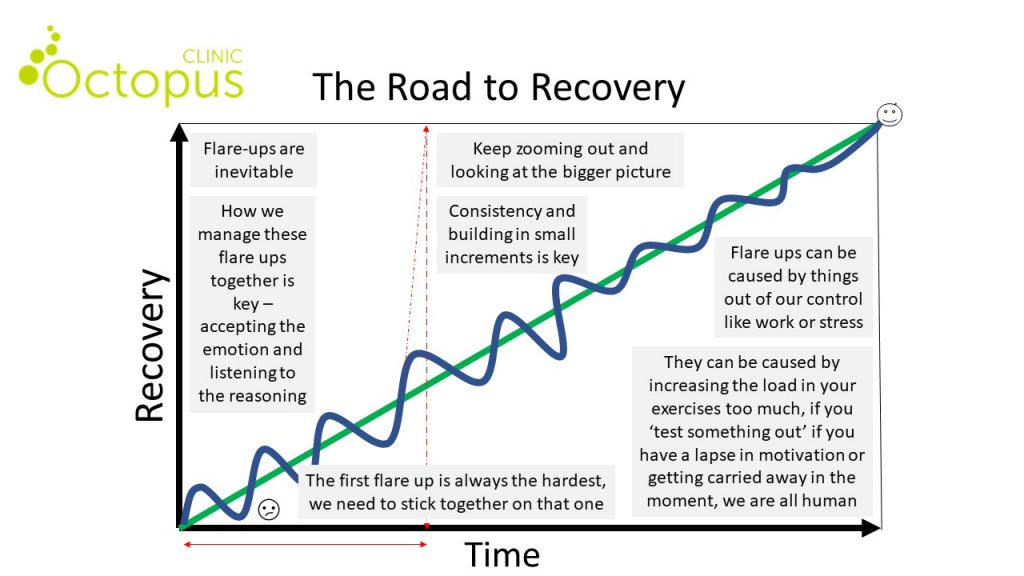Your Road to Recovery from Pain, Injury or Fatigue
Your Recovery Journey
The road to recovery from pain, injury, or fatigue is not smooth. An experienced physiotherapist or osteopath will be able to guide you through these ups and downs by empowering you with the knowledge and skills to manage them. Broadly speaking, the more severe your symptoms are, and the longer you have had them, the longer your recovery will be. The longer the recovery the more flare-ups you will have and how you manage these downturns in recovery will make a big difference to your total recovery time.
Managing Flare-ups
The diagram below outlines the key steps in minimizing the impact of flare-ups:
- Don’t do it alone – make sure you tell us when you are having a flare-up so we can get to the bottom of the cause, give you a clear explanation of the physiology of why it is happening, give you all the tools to make sure you come out of the flare-up as quickly as possible and minimize the risk of recurrence.
- If the activity or ‘load’ is only ever increased in small increments then the flare-ups will be minimal so use your activity diary to keep an eye on all of these potential aggravating factors. If you don’t know what an activity diary is please ask your physio/osteopath. You can also watch this video on the topic: https://youtu.be/6nNYg8Gnry8
- Pacing is really important to minimise flare-ups. Your physiotherapist or osteopath will ask you to grade all daily activities, hobbies, and sports, that are affected by your pain or symptoms. They will use a score like the ‘PSFS’ score which asks you to grade all these between zero and ten. Zero is unable to do the activity and ten is no problem at all with the activity. There may be some zeros identified but there will also be many that range from one to nine. Although it can be challenging to identify these numbers, it is super helpful in creating a baseline from which we can build and assess progression. It also makes sure that we target your treatment plan to your goals as we progress through the recovery journey. You can find out more about this in this video: https://youtu.be/uRLe_msDB1I
- Flare-ups can be caused by things within our control and things out of our control. We are all human, we all make mistakes and we all have a finite amount of motivation so there will be times when we do things that we know are not the right thing to do.
- Your physiotherapist or osteopath is always trying to find the perfect amount of loading which results in just enough microtrauma for the body to adapt and create stronger, more resilient tissues whilst not creating so much microtrauma that there is excessive pain and/or inflammatory reaction. This fine line will inevitably be crossed sometimes.
- The first flare-up is the hardest so it is super important to ask for help at that point.
- When a flare-up occurs it is important to recognize and accept the inevitable emotions that come with it and try to listen and respond to the reasoning that sits alongside those emotions.
- There are lots of techniques that can be used for this which your physio or osteopath can explain to you. These include breathing techniques, meditation, mindfulness, and other ways of actively relaxing. Here is a short video on the topic: https://youtu.be/j_OQQCUylwc
- Understanding the physiology of why the flare-ups are happening, and understanding that irreversible damage has not taken place is really important for most people. Your physiotherapist or osteopath will do this for you.
- There are lots of things within your control that can influence your recovery. Here is a short video touching on these things: https://youtu.be/r6fudRw-RHw
- Always zoom out and look at the bigger picture. When things are improving faster than expected be careful not to raise your expectations unrealistically.
- Keep this diagram in your mind, and save it on your phone so you can refer to it whenever you need it:

Get in touch
To get in touch with your physiotherapist or osteopath, or to book in and get back on that path to recovery, please email reception@octopusclinic.com.
We look forward to guiding you to full recovery.
Lucy Macdonald and the Octopus Clinic Team